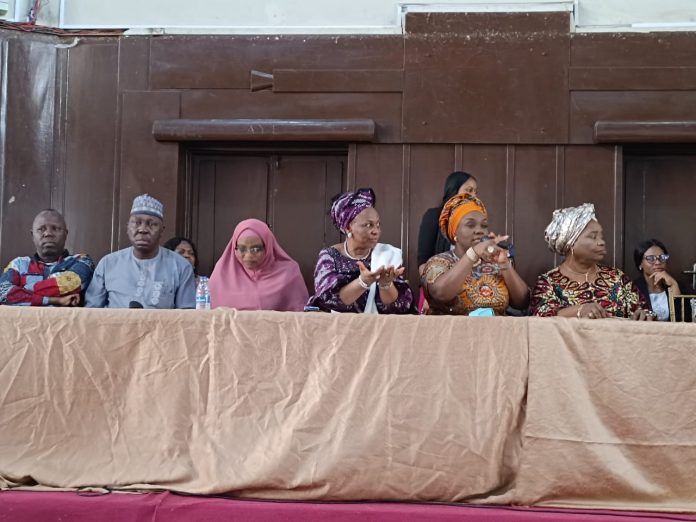… Girls were forced to miss school due to lack of sanitary items
By Palma Ileye
Ministry of Women has disclosed that research made reveals that globally, girls were forced to miss school due to a lack of sanitary items.
Permanent Secretary, Ministry of Women Affairs, Mrs Monilola Udoh revealed this yesterday during event to flag off the distribution of reusable pads for the use of Women of reproductive age and adolescent girls in Ibadan, Oyo State.
Udoh stated that millions of women and girls worldwide experience period poverty, which was characterized by limited access to period products, menstrual education, inadequate water sanitation and hygiene facilities.
Adding that cultural norms, stigma, and taboos surrounding menstruation create further barriers to achieving good menstrual health practices.
In her words: “Although people’s experiences of period poverty are varied and unique, the social determinants of health and structural determinants of gender inequality act as key drivers of period poverty across the world, including Nigeria.
“Research has revealed that globally, girls are forced to miss school due to a lack of sanitary items. In Nigeria, about 52 million women and young girls experience menstruation with almost 70% of them having no
access to sanitary pads; 1 in 10 girls miss school for about 48 days in a year because of lack of information and access to safe sanitary products and clean water as well as cultural and religious reasons; shame, stigma and misinformation surrounding menstruation which are contributing factors to serious human rights concerns for women and girls, making them vulnerable to gender discrimination, child marriage, exclusion, violence, poverty and untreated health problems.
“This monthly pattern
of missing out on education has devastating long term effects, not only in terms of educational development, but also on the psyche of young girls and women.
“May I inform you that assessments of menstrual hygiene management in Nigeria show lack of adequate facilities and guidance in schools and communities. The assessment revealed a general culture of
silence and shame on issues of menstrual management due to cultural and religious restrictions, thereby hindering access to information. The
assessment also revealed that menstruation has contributed greatly to absenteeism and low retention of girls in schools especially in rural communities.
“With the increased global attention on Menstrual Hygiene and Health Management, MHHM, and its attendant negative impact on women and girls, efforts are being mobilized to break the traditional barriers, norms and stigma associated with menstrual health and hygiene in Nigeria.
“It is for this reason that the Federal Ministry of Women Affairs, being the National Secretariat for Menstrual Health and Hygiene Management that coordinates all activities of stakeholders on Menstrual Health and Hygiene Management in Nigeria carried out the following interventions:-Approved the institutionalization of Menstrual Health and Hygiene management in Nigeria and approved that Nigeria should join other countries of the world to commemorate 28th May, each year as the Menstrual Health and Hygiene Day; Approved the development of the National Policy and National
Strategic Framework on Menstrual Health and Hygiene
Management in Nigeria, which is ongoing; its main objectives include to encourage state and non-state actors to collectively and effectively improve women and girls access to improved Menstrual health and Hygiene during menstruation; carry out advocacy, sensitization and awareness on social norms and taboos and promote comprehensive menstrual waste management, leading to improved well-being and full realization of life, while also promoting gender equality in the country; and Set up of Technical Working Groups on Menstrual Health and Hygiene Management in Nigeria and mapping of stakeholders which
comprises of line Ministries, CSOs, NGOs, IPs and donors etc. Carrying interventions at the National, States and Local Levels.”
She said that Ministry of Women Affairs as part of her continued efforts to promote Menstrual Health and Hygiene Management among women and adolescent girls in communities, in collaboration with stakeholders has been distributing disposal and reusable pads and carrying out sensitization in communities, heath facilities and schools in rural and urban centres across the country on basic hygiene on
menstruation, sanitation, access to quality water and addressing challenges of gender norms, taboos, myths and stigma including period poverty.
“It is important for us to know today, that a girl who is empowered to manage her menstruation safely, hygienically with confidence and without shame is more likely to stay in school once she reaches puberty, less likely to get married early or have children when she is not ready. Therefore, investing in interventions to empower
young girls to manage their menstruation safely, hygienically and confidently is not only a moral right but also promotes the fundamental
human rights of women and girls. It is also important to know that Nigeria will not be able to achieve the SDGs without addressing the menstrual needs of women and girls.
“It is in realisation of the above that the Federal Ministry of
Women Affairs distributed 39,000 reusable pads to 13 States across the country (Adamawa, Borno, Kwara, Plateau, Jigawa, Zamfara, Edo.
Bayelsa, Imo, Enugu, Ogun, Ekiti and Oyo) we are here to launch the 3,000 packs that were distributed to Oyo State. Although, this is a drop
in the ocean considering the number of women who menstruate in the State, it is without any doubt a step in the right direction,” she further stated.
She called on the Government and the good people of Oyo State to support the rights and health of women and girls through free donation of pads to reduce period poverty in the State also thanking the First Lady of Oyo State, Mrs. Tamunominini Seyi Makinde for supporting and accepting to create awareness and sensitize the good people of Ibadan
on the need to adopt good menstrual hygiene practices.







